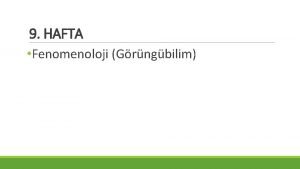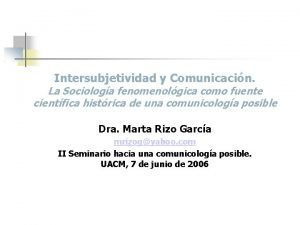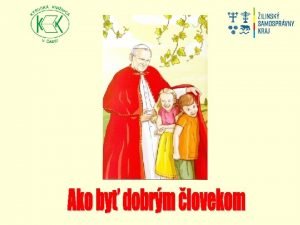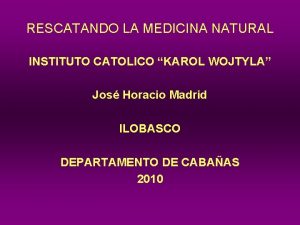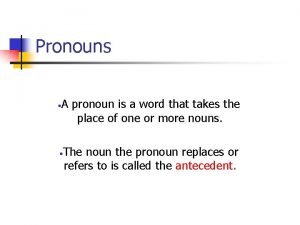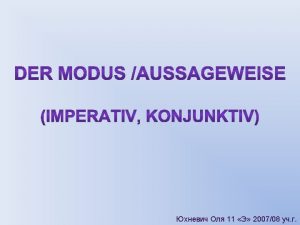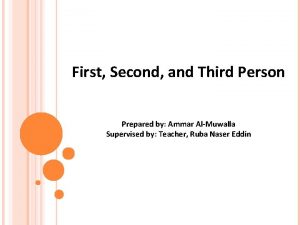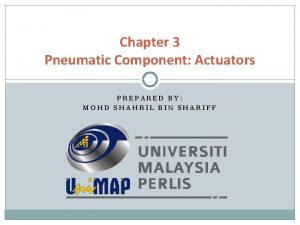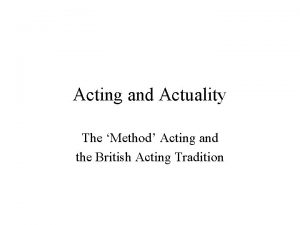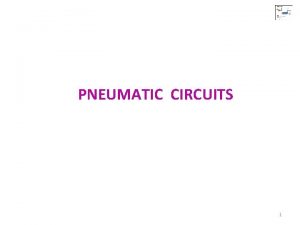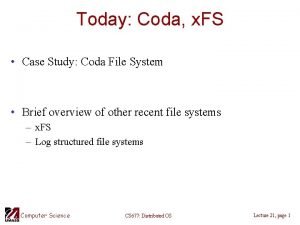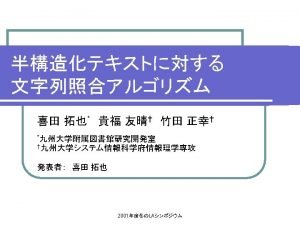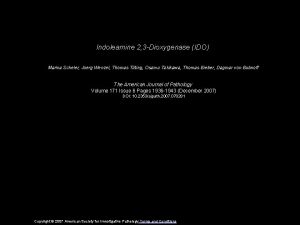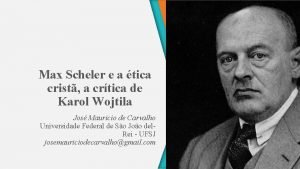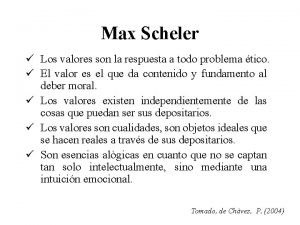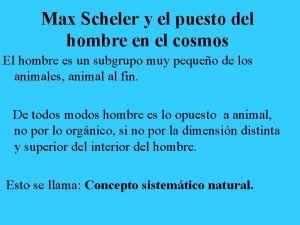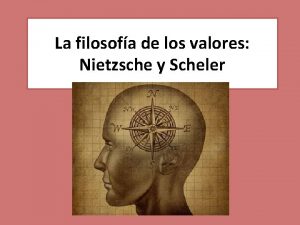Wojtyla The Acting Person Coda Husserl Reinach Scheler












- Slides: 12

Wojtyla: The Acting Person

Coda

Husserl Reinach Scheler Ingarden • Wojtyła

Holism / Granularity • Wojtyła: The Acting Person (Person and Deed, 1969) • a study of the human person / substance / organism / individual • and of the structures common to all persons and of all human action

Reinach: action vs. passion • what merely happens in a person • vs. spontaneous doings of a person, both internal (choosing, deciding) and external (kissing, kicking). • the person is an enduring dynamic centre of spontaneous acts • Problem: there is a range of different dynamic orders in which each person is involved which he must somehow integrate through the choices he makes through his life. • Persons create themselves by acting.

Man acts • • • Acting is the first of many dynamisms (=dimensions of dynamic activity and organization) in the structure of the human person. Acting is conscious, and consciousness, too, is a dynamism in the structure of the person. There also bodily dynamisms, e. g. the circulation of the blood How is this multiplicity of dynamisms to be unified by the person through actions?

Consciousness mirrors external reality • • • But it is aware also (as it were from the inside) of the actions of the person whose consciousness it is. When we act we experience our action 1. as a doing of which we are the agent, as something which we are now directly (causally) responsible for bringing about. 2. as reflecting certain conscious processes in ourselves called desires. 3. (sometimes) as a bearer of moral value or disvalue (= as part of a drama of good and evil within ourselves)

The dynamism of feelings and emotions • Some of our consciousness is so intensely emotionalized that the emotions take over from a more reasonable, cognitive consciousness. • The objects and the actions which make up our world are to different degrees valuable and our emotions are sensitive to these values. • Our cognitive, reasoned consciousness, too, is then able to grasp these same values as it were second hand. It then has the task of bringing about a unity of the person through diminution of the strife to which our awareness of values would otherwise give rise. • In the case of an over-emotionalized consciousness, there is a struggle between the intense emotions which our consciousness is effected by and our consciousness itself. And sometimes, of course, consciousness loses, we find it impossible to act in such a way as to bring about an integration of our person. The person as unity disintegrates.

Freedom • Every action is in principle able to involve an experience of freedom • But only a person who has a relatively low degree of emotionalization of his consciousness and a relatively high degree of integration of his person experiences this "I may, but I need not". Hence only such a person is free. • Freedom presupposes self-possession • Self-possession presupposes the cognitive awareness that my decisions are contributing to the integration or unification of my person.

Freedom thus presupposes a reference to truth • and not only a reference to the objects which elicit the corresponding actions • Someone who is living in error is not free • Just as there is a dynamism which makes us constantly aware of and constantly receptive to value in the outer world, constantly choosing and deciding, moving this way and that in relation to outer objects, so there is a similar dynamism in the inner world, a receptivity to inner value, called "conscience". Conscience serves control the goodness or the badness of our actions: it serves to control the degree to which our acts of will are such as to respect the truth.

Two broad classes of human dynamisms: relating to consciousness, and relating to the body • solution to the mind-body problem • The mental and bodily dynamisms are brought to a unity on the higher level constituted by the dynamisms of human action. Integration occurs, for instance, through the cultivation of bodily skills through work and practice à la Merleau. Ponty (and virtue, too, is a skill which can be acquired, like swimming or piano-playing).

All men • have the ability to use conscience in order to distinguish truth from falsity as far as their acts are concerned, and to do this infallibly (a view embraced also by Brentano in his Religion und Philosophie)
 Felsefe paranteze alma
Felsefe paranteze alma Edmund husserl aportes
Edmund husserl aportes Intersubjetividad
Intersubjetividad Karol wojtyla
Karol wojtyla Diarrein
Diarrein Lesson 6 intersubjectivity philosophy answer key
Lesson 6 intersubjectivity philosophy answer key Example of personal pronoun
Example of personal pronoun 1. person 2. person 3. person
1. person 2. person 3. person Second person point of view
Second person point of view Person person = new person()
Person person = new person() Single acting and double acting cylinder
Single acting and double acting cylinder Method acting vs natural acting
Method acting vs natural acting Single acting cylinder schematic
Single acting cylinder schematic
